Knowledge Transfer Group “Augmented and Virtual Reality”
The metaverse is here, and it’s not only transforming how we see the world but how we participate in it – from the factory floor to the meeting room.
The group always meets every last Thursday of the month from 16:00 - 17:30
If you would like to either join the group or just attend a specific meeting, please apply here.
Events

The KTG AR/VR hosted an online session to explore how enterprises and educational institutions can manage their mixed reality headsets efficiently and securely, from device setup to large-scale deployment, monitoring, and collaboration.
As mixed reality increasingly becomes a core tool for training, design workflows, remote assistance, and collaborative learning, organizations must handle the growing complexity of managing entire fleets of devices. The session focused on practical strategies and tools that simplify these challenges and support scalable, secure operations.
A central highlight was Meta Horizon Managed Services (HMS) — Meta’s native platform for enterprise and educational environments.
Our guest speakers represented Schenker Technologies, a leading provider of advanced hardware solutions and an official partner for Meta’s enterprise products. Drawing on their extensive experience, they shared practical insights and best practices for deploying and managing mixed reality systems effectively in corporate and educational settings.
For those who missed the live session or would like to revisit the content, the full recording is available on YouTube.
https://www.youtube.com/watch?v=D4eLIoKCyf0
The KTG hosted an online session showcasing VUSE XR, a no-code SaaS platform that is revolutionizing how industrial and life science teams communicate complex products through immersive 3D experiences.
VUSE XR enables teams to create, adapt, and scale product simulations without technical expertise—replacing outdated videos, static PDFs, and costly demos with engaging, interactive experiences. These simulations enhance product understanding, accelerate decision-making, and reduce effort across training, sales, and support—accessible on any device, anywhere in the world.
During the session, participants learned how VUSE XR empowers organizations to transform their communication workflows, making product knowledge easier to convey and more impactful.
Speakers were Niclas Matthias, Founder and CEO of VUSE XR, who brings over five years of experience in immersive technology and a business-driven approach to innovation, and Daniel Wassy, Head of Product, whose current role focuses on driving the strategic direction and development of innovative XR solutions—translating complex technical capabilities into impactful, user-centric products.
For those who missed the live event or wish to revisit the content, the full session recording is available on YouTube:
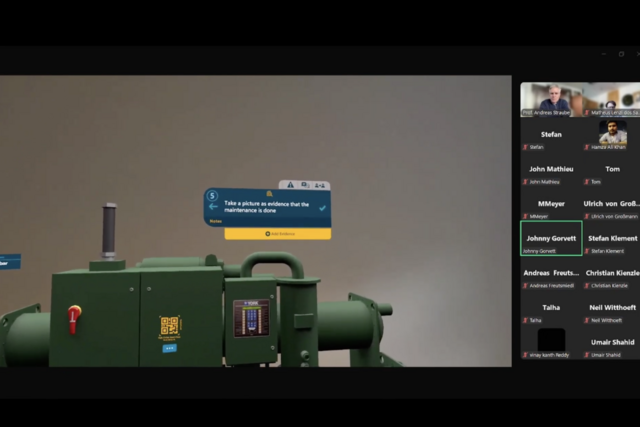
The KTG hosted an online session showcasing Taqtile’s Manifest, an AI-powered digital work assistant platform. Manifest enables the capture and documentation of expert knowledge through clear, step-by-step instructions enriched with multimedia and spatial capabilities, ensuring consistency and reducing errors across operations.
During the session, participants explored how Manifest integrates with existing systems to enhance accuracy, reduce training costs, and provide detailed audit trails. The platform empowers users to access essential information anytime and anywhere, document procedures, collaborate with remote experts, and analyze job performance data.
Speakers were Johnny Gorvett, Technical Solutions Specialist at Taqtile with a strong background in 3D and spatial computing, and John Mathieu, Managing Director of Taqtile Europe, with deep experience in enterprise sales and business development. Together, they offered practical insights into how Manifest is redefining mixed-reality guided work in industrial settings.
For those who missed the live event or wish to revisit the content, the full session recording is available on YouTube:
KTG Session on Taqtile Manifest
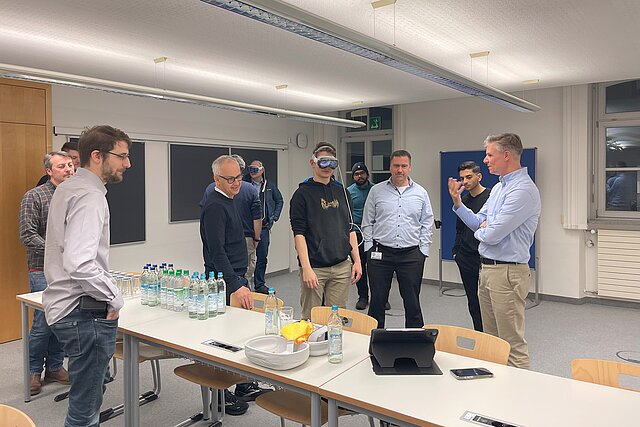
The Knowledge Transfer Group for Augmented and Virtual Reality showcased the Apple Vision Pro, a mixed reality headset that integrates augmented and virtual environments. Designed for immersive experiences, the Vision Pro offers exceptional capabilities in 3D visualization, intuitive interaction, and collaborative workflows. Guided by Daniel Gelder, Technology Evangelist for the Apple Vision Pro and VisionOS at Apple, this session exemplifies the Knowledge Transfer Group’s mission to connect innovation with practical applications. During the demonstration, participants engaged with applications that highlight its potential in design, engineering, and training scenarios. The advanced spatial computing capabilities of the Vision Pro define how users interact with digital content, merging the physical and virtual worlds in distinctive ways.
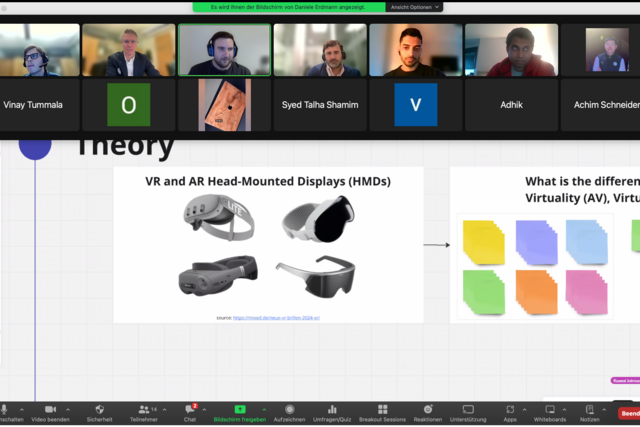
Augmented Reality (AR) and Virtual Reality (VR) are playing an increasingly important role in industry. However, the implementation of these technologies and the development of corresponding content are often costly, which poses a particular challenge for small and medium-sized enterprises. It was investigated to what extent AR and VR applications can offer advantages over traditional representations and computers, and how advanced existing applications in engineering already are.
About the speaker
Daniele Erdmann is an experienced industrial engineer with a versatile background. After completing his vocational training as an industrial mechanic, he began a part-time degree program at the MCI in Innsbruck. After a few semesters, he decided to return to his hometown and continue his academic career at the University of Applied Sciences Rosenheim, where he specialized in Industrial Engineering. Under the supervision of Mr. Straube, he wrote his bachelor thesis, which contributes to the advancement and application of Augmented Reality (AR) and Virtual Reality (VR) in engineering. Throughout his professional career, he has deepened his knowledge in the practical implementation of process optimization and product quality improvement. Daniele Erdmann has gained extensive experience in various fields, particularly in Lean Management, Quality Management, and as a technical draftsman, and currently works as a Configuration Manager at Bertrandt. With his passion for increasing efficiency and continuously improving processes, Daniele Erdmann is always looking for innovative solutions to maximize both product quality and the efficiency of production processes.
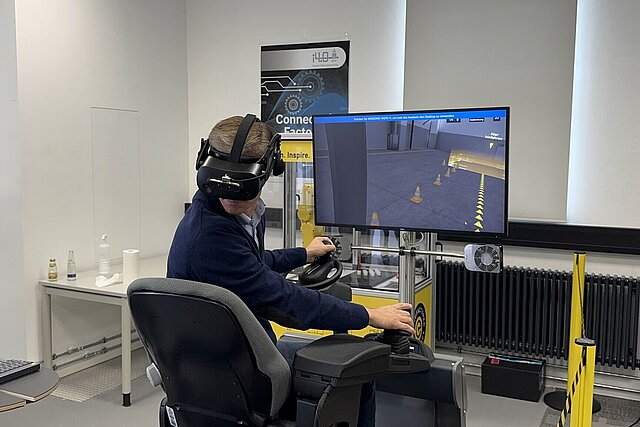
The Knowledge Transfer Group for Augmented and Virtual Reality visited the BSH Home Appliances Group Campus in Traunreut and had the opportunity to try out a forklift simulator from Jungheinrich AG. We are also able to invite other companies and students from our Advanced Industrial Engineering Master’s program. Thomas Eberl Logistik and Adelholzener Alpenquellen GmbH were present, and everyone had the chance to try out the simulator.
The simulator consists of a motion platform with a forklift cabin—complete with a seat, steering wheel, gas and brake pedals, and control buttons. It can be used with a regular monitor, but the real excitement comes when paired with a virtual reality headset. The motion platform simulates different surfaces and track imperfections that need to be avoided during training. For someone with no prior forklift driving experience, it starts with basic instructions—lifting the fork, adjusting the angle, driving forward and backward, and braking. With the VR headset on, it feels like you are in a real logistics environment!
With Jungheinrich's various VR simulators, you will experience a new way of training. Jungheinrich's professional VR software creates a realistic virtual warehouse environment where trainees can learn the functions of a forklift safely and with enjoyment. What previously required real industrial trucks, a training course, and trained personnel is now made possible with just one device. Read more:
https://www.jungheinrich.de/services/gabelstapler-simulator-789200
With TÜV SÜD IVEE you learn to master dangerous or complex situations in virtual space. TÜV SÜD IVEE stands for Immersive Virtual Expert Experience - a completely new type of digital learning. With immersive training (virtual reality, 360° tours, serious games), different situations can be experienced virtually. Simple VR glasses or a computer are completely sufficient for this. With our Virtual Training Solutions, users can train for their tasks safely and clearly. Immersive learning is particularly suitable for vehicle and machine drivers, as well as for simulations of dangerous situations and personal safety.
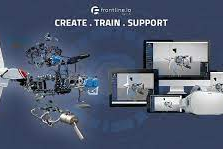
Frontline.io is a cutting-edge platform that revolutionizes the way organizations deliver training and support. They harness the power of AR, VR, and Digital Twin technology to simplify the learning experience and improve support efficiency. Their goal is to help businesses focus on what really matters: getting work done
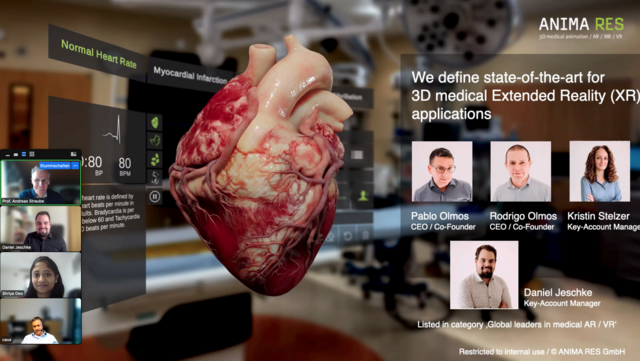
ANIMA RES is a specialist in 3D medical animations and interactive Augmented Reality, Mixed Reality and Virtual Reality applications with a particular focus on the pharmaceutical, medical and biotechnological sectors. Their goal is to make medical education fascinating, explorable, and fun for physicians, students as well as accessible to patients – anywhere and anytime. They are passionate about taking medical education one step further and have developed visually stunning and highly interactive content based on real life medical and scientific specifications. As an internationally recognised expert for AR, MR and VR they work closely together with the leading tech companies such as Apple, Microsoft and Google.
About the speaker
Daniel Jeschke is an accomplished professional with a diverse background spanning the fields of pharmaceuticals and medical education. Currently serving as a Key Account Manager at Anima Res GmbH in Stuttgart, Germany. Daniel demonstrates expertise in project management and medical advisory tasks, particularly in 3D animations for medical education and communication along with coordinating ongoing projects, organizing congress appearances, and providing global technical support. Prior to his current role, Daniel held positions as a Key Account Manager at Otsuka Pharma GmbH, focusing on rheumatology and nephrology, and at Berlin-Chemie AG as a pharmaceutical representative, specializing in respiratory diseases and diabetology.

Halocline GmbH & Co. KG is a software start-up whose VR editor solution of the same name enables the creation of a realistic virtual factory. The natural interaction in VR makes it possible to incorporate knowledge from production experience into the work with digital data. Three product stages: Halocline Assembly, Halocline Layout and Halocline Performance offer product assembly, layout planning and process evaluation in the digital twin of the factory.
About the speaker
Kris Izdebski studied Cognitive Science. A core element of his studies: understanding and analysing human behaviour from all possible perspectives. When he founded the Virtual Reality Laboratory at Osnabrück University, he posed the question: How do people behave in virtual space? When he switched to the business sector, the question arose: What benefits can people derive from VR technology? He now brings his scientific way of thinking to the software company Halocline as head of Halocline Labs.

The theme of the June Knowledge Transfer Group AR/VR meeting was Collaborative spatial design with Arkio, and the speaker was Johan Hanegraaf from Arkio. https://www.arkio.is/
About Arkio
Arkio is a collaborative design tool to create buildings, interiors and urban plans together using VR, AR, desktop and mobile devices. Arkio integrates with your current design workflow - easily import 3D models, try out new design ideas with others and export your work back to native BIM geometry.
About the speaker
Johan Hanegraaf is Co-founder & Head of Product of Arkio. With 15+ years of experience in the architecture industry, Johan specialized in computational design, BIM and VR/AR software development before joining Arkio to create a unique collaborative spatial design tool. As an architect and engineer by training, he believes immersive technologies have the potential to redefine our design process and enhance our real and virtual built environments.

The May's Knowledge Transfer Group AR/VR meeting took place at Krones-Akademie in Kolbermoor (next to Rosenheim), with Manuel Ostermann, Head of Training of Krones AG, and Georg Wünsch, Managing Director of machineering GmbH & Co. KG, as speakers.
The participants were invited to see on-site how Krones is implementing AR technology for trainings in their company, using the software from machineering GmbH & Co KG. During the meeting, we were able to use Microsoft Hololens 2 AR glasses to see a virtual machine from Krones, as well as hear from experts about this application of AR and its benefits.
https://www.krones.com/de/index.php
About Krones
Krones plans, develops and manufactures all of the machines and complete lines for the sectors of process, filling and packaging technology.
In 2021, the idea of digitally simulating machines using augmented reality (AR) was born, to add virtual objects to the real environment using glasses. The more the team advanced with the technology, the more benefits and potential for innovation there were for the various departments in the value chain. A holographic simulation can be used optimally to bring situations in training that must be avoided on the real machine due to possible dangers and risks.
In the Krones plant in Rosenheim, all machines are already being designed with such great detail that it will be possible to kinematize them as models without much additional effort.
"You have to have the feeling of standing in front of the real machine - as if it were a hologram," says Manuel Ostermann about interacting with virtual machines.
About machineering GmbH & Co. KG
The company pursues the goal of solving the topic of virtual commissioning in mechanical engineering with the help of the 3D real-time platform iPhysics. With the topic of virtual commissioning of production systems, Dr.-Ing. Georg Wünsch (Georg) completed his doctorate at the Technical University of Munich in 2008 and, together with Beate Maria Freyer, founded the company machineering GmbH & Co. KG. Georg still stands until today as shareholder, developer and CTO.
"The work for the Krones company in the areas of virtual commissioning and, in particular, digital training systems enjoys very special significance." - Dr.-Ing. Georg Wünsch.
The theme of April's Knowledge Transfer Group AR/VR meeting was “Meet your reality in shop floor and assembly planning with XR-EASY”, with Achim Schneider, co-founder and first investor of R3DT. https://xr-easy.com/
R3DT’s mission is to offer the most user-friendly VR tool for engineering and planning. It allows anyone to generate virtual prototypes from existing 3D models at the touch of a button. Collaborative reviews with all stakeholders enable users to make better and faster decisions at any point in the process.
About the speaker
The speaker was Achim Schneider, co-founder and first investor of R3DT. As product owner and sales manager, he is responsible for the startup's business development. After 25 years at Porsche, Bosch, MTU, Infineon and Jenoptik, he is now living his dream of entrepreneurial freedom.
The theme of the March Knowledge Transfer Group AR/VR meeting was Immersive Collaboration and more – Mixed reality use cases for enterprise, with speakers from Sphere https://sphere.tech/ (former HoloOne).
Sphere is a Mixed Reality MR platform for enterprises that does not rely on heavy and expensive customization. It is an out-of-the-box solution for easy integration of MR into business processes. The features and versatility of sphere makes it a universally applicable solution available on the market supporting all common mixed reality devices: The Lenovo ThinkReality A3, HoloLens 2, MagicLeap One and more.
About the speakers
The speakers were Linda Naumann, Business Development Manager, and Hugo Dieterlen, Sales Engineer.
"We are looking forward to introducing all attendees to the possibilities of MR/XR for enterprise and how it is already used today in industries across the globe. Join us for a deep dive on use cases as well as a live demo of the Sphere software and let yourself get inspired. The future is already here!" - Linda Naumann.
The theme of the February Knowledge Transfer Group AR/VR meeting was Introducing Microsoft Mesh, with a speaker from Microsoft.
Microsoft Mesh is a mixed reality platform that allows users to collaborate and interact with digital content in a shared virtual environment. It uses a combination of virtual and augmented reality technologies to create immersive experiences that can be accessed through PCs and VR headsets and in the future on mobile devices. Mesh is designed to enable remote collaboration, social interactions, and immersive experiences across a wide range of industries, including gaming, education, and enterprise.
About the speaker
Mariano Mailos, Mixed Reality & IoT Go To Market Lead.
Mariano comes from Argentina and currently is responsible to lead the execution of Microsoft’s Industrial Metaverse and IoT strategy in Germany.

The January 2023 meeting of Knowledge Transfer Group AR/VR took place on site in BayernLab, Traunstein, and was also transmitted online via Zoom. The participants got the opportunity to explore the Lab and experience some technologies, like the use of a VR Treadmill or pilot a virtual drone by remote control.
Treadmills in virtual reality are often used to enhance the user's immersion and provide a more realistic experience. These treadmills are designed to simulate natural walking or running movements, allowing users to move in a virtual environment without having to physically move through space. By using a treadmill in combination with VR technology, users can engage in immersive gaming experiences, explore virtual environments, or even use it for exercise purposes.
About BayernLab
The BayernLab in Traunstein is an open center for digital knowledge building for young and old and is part of a network of similar labs throughout Bavaria, aimed at promoting digital transformation, innovation, and education.
Visitors can learn about topics such as 3D printing, internet security, virtual reality and much more. BayernLab Traunstein offers a variety of services and resources, including access to cutting-edge technology, workshops, and training sessions.

The November 2022 meeting was the first one to take pace in the virtual reality, with the possibility to join through a computer as well.
The virtual environment of the meeting was Meta’s Workrooms, a virtual space that allows teams to have meetings in the Metaverse. It is possible, for example, to share presentations and write in a whiteboard collaboratively with others.
About the speaker
The speaker was Johannes Neuwieser, at the time a student at TH Rosenheim. He presented his bachelor thesis, with the title „Use of Augmented Reality in Systems engineering “.